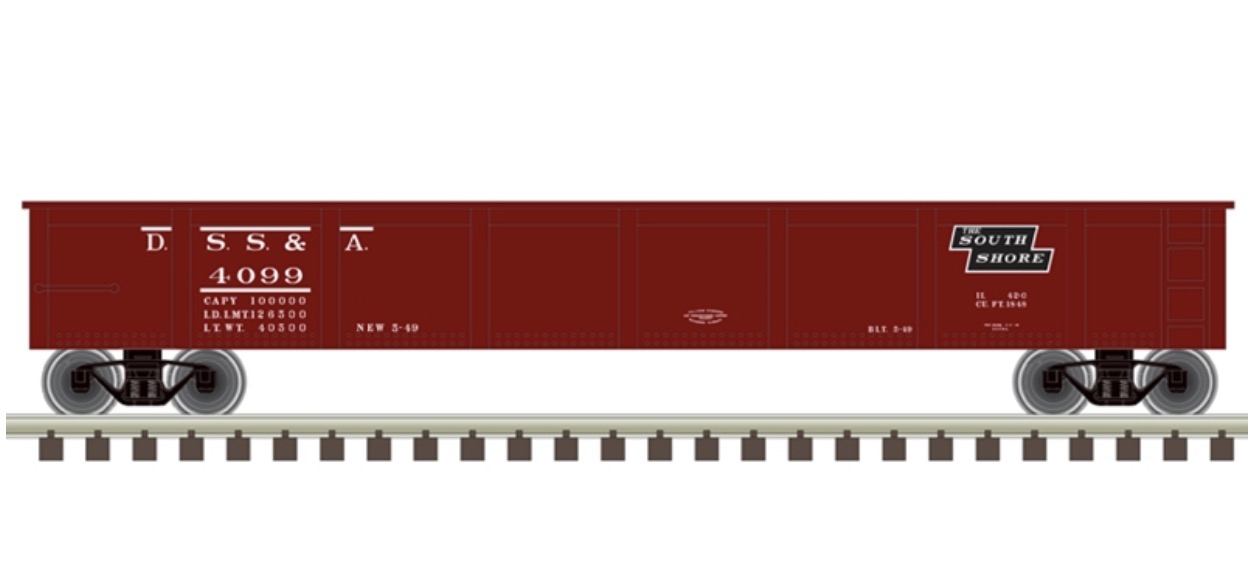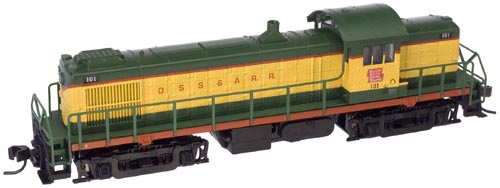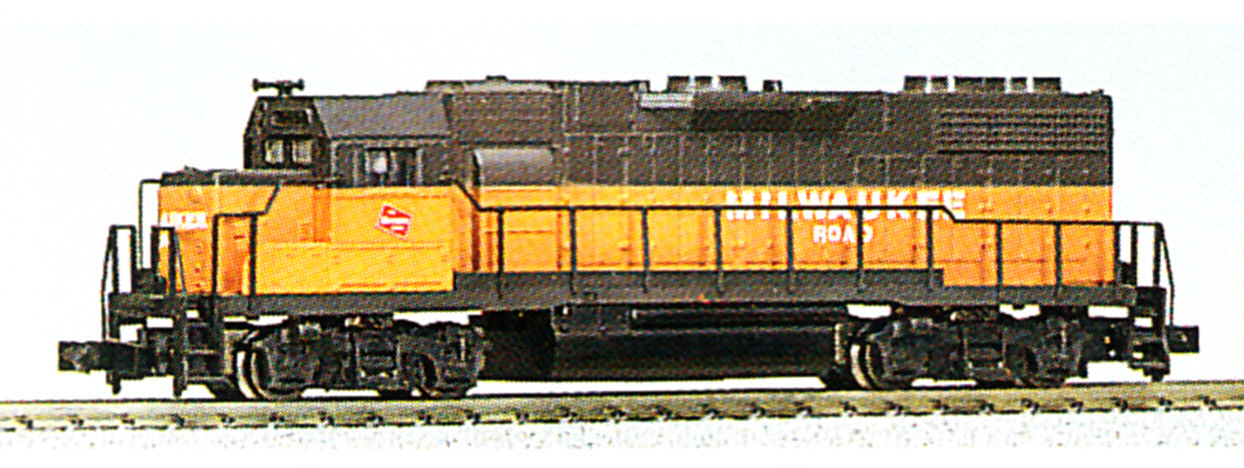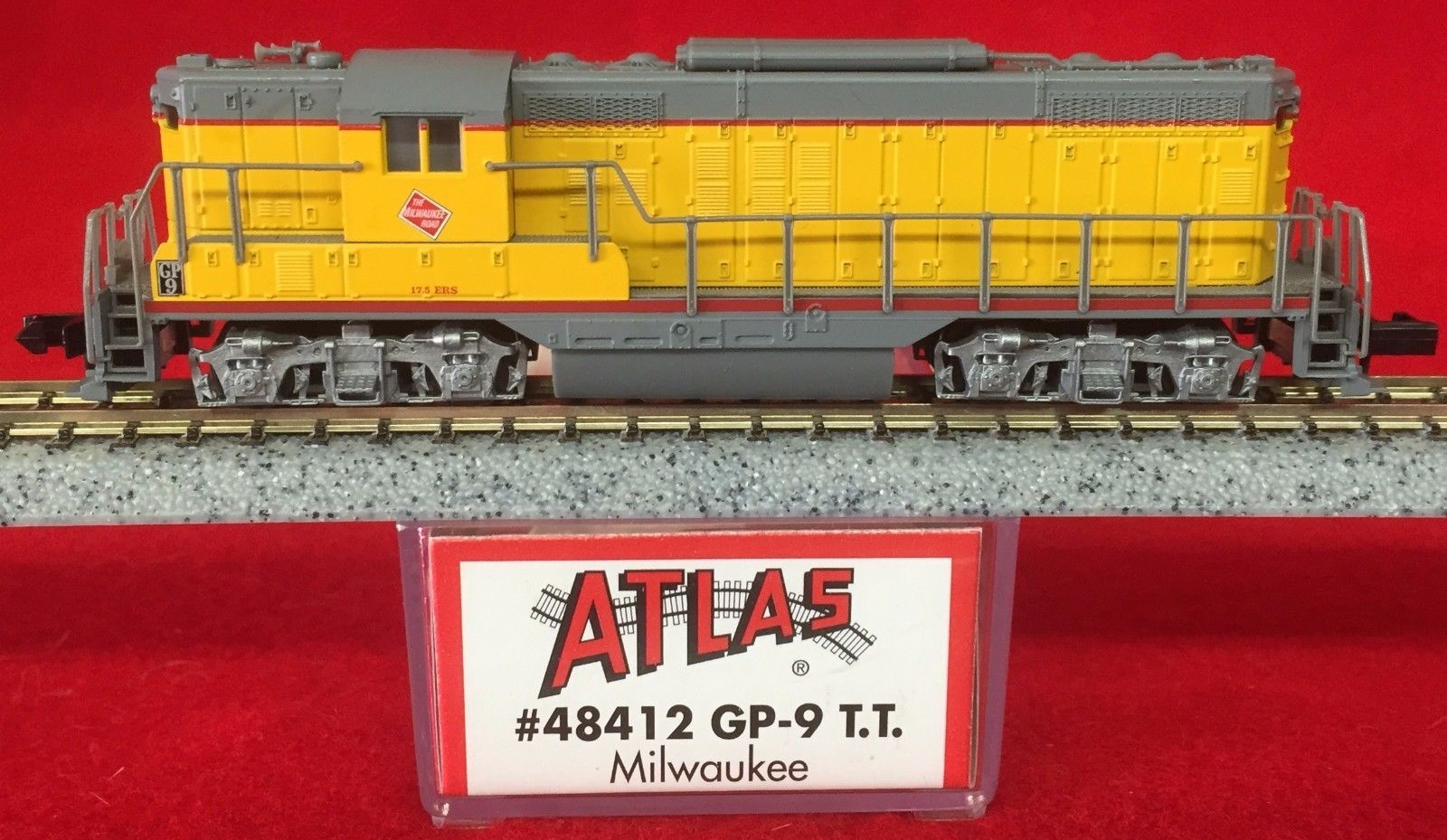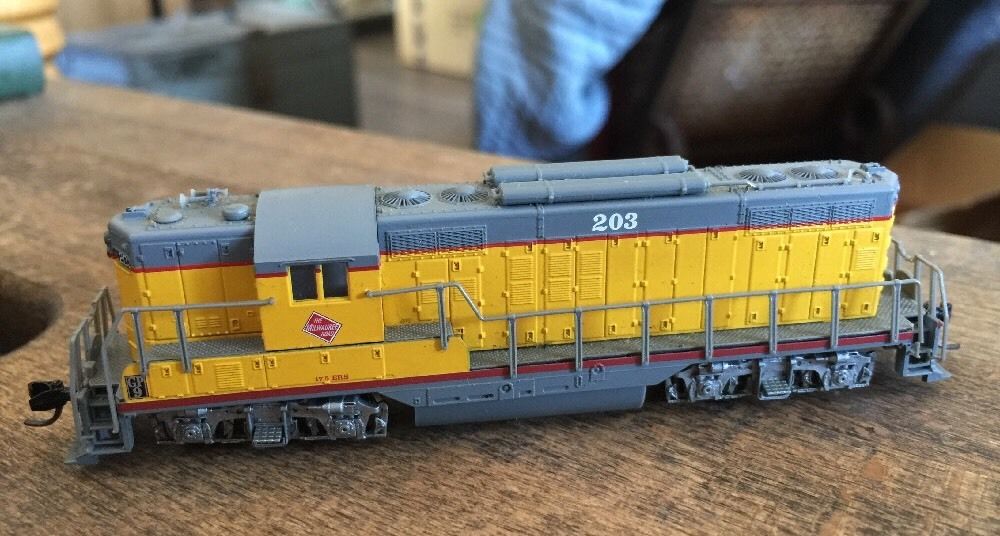Specific Item Information: Removable cement container load.
Model Information: This car was made initially by Rivarossi under contract with Atlas. The tooling was moved the the New Jersey Atlas factory in the early 1970s. The 1971 Atlas catalog lists a C&EI, B&O and SOO release. These never materialized. They did, however produce a Wabash and Rock Island version as their first post-move release. Much much later, the tooling was redone and production moved to China. The Rivarossi and US releases use Rapido couplers. The early Chinese releases likely used Rapido couplers as well. More recent releases use Accumate couplers. See a video of this car on our YouTube Channel
Road Name History: 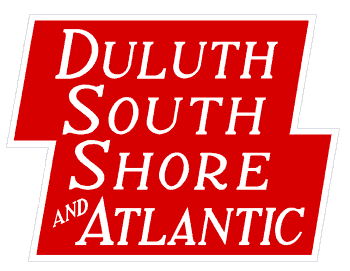 The DSS&A dates to 1887 and was chartered to build from Duluth, Minnesota eastward across Michigan’s upper peninsula, through Marquette to Sault Ste. Marie and St. Ignace. Of course there were a number of connections in Duluth. Sault Ste. Marie had a connection to Canadian Pacific and St. Ignace had car ferry service across the Mackinac Straights to a few lines in Michigan’s lower peninsula. In 1888, Canadian Pacific bought control of the company.
The DSS&A dates to 1887 and was chartered to build from Duluth, Minnesota eastward across Michigan’s upper peninsula, through Marquette to Sault Ste. Marie and St. Ignace. Of course there were a number of connections in Duluth. Sault Ste. Marie had a connection to Canadian Pacific and St. Ignace had car ferry service across the Mackinac Straights to a few lines in Michigan’s lower peninsula. In 1888, Canadian Pacific bought control of the company.
Traffic was intended to be iron and copper ore, and forest products. Other lines building into the region took most of the ore traffic, leaving the DSS&A the forest products traffic. The DSS&A paid dividends to parent Canadian Pacific in just two narrow windows over the next 65 years.
As for passenger service, locals served the mining and logging communities along the line. The closest thing to a name train was the DSS&A operation of the Duluth to Calumet, Michigan end of Milwaukee Road’s Copper Country Limited. All passenger service ended in 1958, and DSS&A’s Budd RDC’s went to parent Canadian Pacific.
The most modern steam power was in the form of former New York Central Mikados. DSS&A started buying diesels in 1947 with Alco RS1’s for use as switchers plus units with steam generators to replace steam on the passenger runs. Later, they picked up Baldwin RT series center cab transfer diesels for road service (go figure.) They were down much of the time with cracks in the frame and engine block. So DSS&A went back to Baldwin for DRS series 6-axle hood units for road service. These were operated in long-hood-forward pairs. Although the RS1’s had been delivered in plain black with yellow zebra nose stripes and yellow initials, the Baldwins were delivered in a fancy yellow, green, and Chinese red. The RS1s were repainted in this scheme as they came due for shopping. Ultimately, they did begin lashing together 3-unit sets of RS1’s for road service as well.
On December 30, 1960, Canadian Pacific’s US holdings in the area were merged. This included the Duluth South Shore & Atlantic, the Minneapolis St. Paul & Sault Ste. Marie (popularly known as Soo Line), and the original Wisconsin Central. Ironically, it’s the DSS&A’s corporate charter that was the survivor of the merger but the name of the combined line became “Soo Line Railroad.”

Traffic was intended to be iron and copper ore, and forest products. Other lines building into the region took most of the ore traffic, leaving the DSS&A the forest products traffic. The DSS&A paid dividends to parent Canadian Pacific in just two narrow windows over the next 65 years.
As for passenger service, locals served the mining and logging communities along the line. The closest thing to a name train was the DSS&A operation of the Duluth to Calumet, Michigan end of Milwaukee Road’s Copper Country Limited. All passenger service ended in 1958, and DSS&A’s Budd RDC’s went to parent Canadian Pacific.
The most modern steam power was in the form of former New York Central Mikados. DSS&A started buying diesels in 1947 with Alco RS1’s for use as switchers plus units with steam generators to replace steam on the passenger runs. Later, they picked up Baldwin RT series center cab transfer diesels for road service (go figure.) They were down much of the time with cracks in the frame and engine block. So DSS&A went back to Baldwin for DRS series 6-axle hood units for road service. These were operated in long-hood-forward pairs. Although the RS1’s had been delivered in plain black with yellow zebra nose stripes and yellow initials, the Baldwins were delivered in a fancy yellow, green, and Chinese red. The RS1s were repainted in this scheme as they came due for shopping. Ultimately, they did begin lashing together 3-unit sets of RS1’s for road service as well.
On December 30, 1960, Canadian Pacific’s US holdings in the area were merged. This included the Duluth South Shore & Atlantic, the Minneapolis St. Paul & Sault Ste. Marie (popularly known as Soo Line), and the original Wisconsin Central. Ironically, it’s the DSS&A’s corporate charter that was the survivor of the merger but the name of the combined line became “Soo Line Railroad.”
Brand/Importer Information: In 1924 Stephan Schaffan, Sr. founded the Atlas Tool Company in Newark, New Jersey. In 1933 his son, Stephan Schaffan, Jr., came to work for his father at the age of sixteen. Steve Jr. built model airplanes as a hobby and frequented a local hobby shop. Being an enterprising young man, he would often ask the owner if there was anything he could do to earn some extra spending money. Tired of listening to his requests, the hobby-store owner threw some model railroad track parts his way and said, "Here, see if you can improve on this".
In those days, railroad modelers had to assemble and build everything from scratch. Steve Jr. created a "switch kit" which sold so well, that the entire family worked on them in the basement at night, while doing business as usual in the machine shop during the day.
Subsequently, Steve Jr. engineered the stapling of rail to fiber track, along with inventing the first practical rail joiner and pre-assembled turnouts and flexible track. All of these products, and more, helped to popularize model railroading and assisted in the creation of a mass-market hobby. The budding entrepreneur quickly outgrew the limitations of a basement and small garage operation. Realizing they could actually make a living selling track and related products, Steve and his father had the first factory built in Hillside, New Jersey at 413 Florence Avenue in 1947. On September 30, 1949, the Atlas Tool Company was officially incorporated as a New Jersey company.
In 1985, Steve was honored posthumously for his inventions by the Model Railroad Industry Association and was inducted into the Model Railroad Industry Hall of Fame in Baltimore, Maryland. In addition, Steve was nominated and entered into the National Model Railroad Association Pioneers of Model Railroading in 1995.
In the early 1990s, the Atlas Tool Company changed its name to Atlas Model Railroad Company, Inc.
In those days, railroad modelers had to assemble and build everything from scratch. Steve Jr. created a "switch kit" which sold so well, that the entire family worked on them in the basement at night, while doing business as usual in the machine shop during the day.
Subsequently, Steve Jr. engineered the stapling of rail to fiber track, along with inventing the first practical rail joiner and pre-assembled turnouts and flexible track. All of these products, and more, helped to popularize model railroading and assisted in the creation of a mass-market hobby. The budding entrepreneur quickly outgrew the limitations of a basement and small garage operation. Realizing they could actually make a living selling track and related products, Steve and his father had the first factory built in Hillside, New Jersey at 413 Florence Avenue in 1947. On September 30, 1949, the Atlas Tool Company was officially incorporated as a New Jersey company.
In 1985, Steve was honored posthumously for his inventions by the Model Railroad Industry Association and was inducted into the Model Railroad Industry Hall of Fame in Baltimore, Maryland. In addition, Steve was nominated and entered into the National Model Railroad Association Pioneers of Model Railroading in 1995.
In the early 1990s, the Atlas Tool Company changed its name to Atlas Model Railroad Company, Inc.
Item created by: CNW400 on 2024-01-31 10:47:42. Last edited by CNW400 on 2024-01-31 10:47:43
If you see errors or missing data in this entry, please feel free to log in and edit it. Anyone with a Gmail account can log in instantly.
If you see errors or missing data in this entry, please feel free to log in and edit it. Anyone with a Gmail account can log in instantly.


